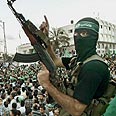
Jerusalem’s official position states that Israel must not hold talks with Hamas as long as the groups does not disarm and annuls its charter, which rejects Israel’s existence. Due to this Israel is opposed to the participation of Hamas in the January 2006 Palestinian elections.
The legal foundation for this claim was presented a decade ago in an interim agreement that stated “parties that preach racism or are attempting to reach their goals through illegal or undemocratic means” are prohibited from participating in elections.
However, in light of the new reality, Israel’s position may turn out to be a mistake.
First of all, Israel must keep in mind that the “Hudna” (agreed-upon lull in violence) is not based on the Palestinian Authority’s law enforcement capabilities, but rather on agreements between the PA and Hamas. Therefore, any attempt to examine the latter’s political power may result in a chain of events during which that would undermine the agreements, weaken the PA, increase violence against Israel and strengthen Hamas.
Proof of this could be seen in the spring of 2005, when Fatah attempted to revise the elections law in such a way that the organization would gain power at the expense of Hamas, after Hamas had gained strength in the municipal elections. Hamas responded by boosting its terror activities against Israel to apply pressure on the PA.
In light of this, PA Chairman Mahmoud Abbas is facing a problem. If Hamas lays down its arms, the chairman would be forced to pay a high political price that would lead to a change in the balance of power between Hamas and Fatah. However, if Abbas will prevent Hamas from participating in the elections as a regular political party, Hamas may present itself as an alternative to the entire Palestinian Authority, not only to Fatah.
Either way, Hamas may become stronger, at the PA or Fatah’s expense.
Secondly, the international community’s position toward Hamas is hesitant. On the one hand, the Americans and Europeans have declared that Hamas is a terror organization and therefore will not deliberate with the group. On the other hand, the Americans and Europeans will have a hard time not holding talks with Palestinian representatives that were elected democratically, especially in light of the fact that the U.S. and Europe are encouraging Palestinian elections in accordance with the first phase of the Road Map initiative.
Therefore, it is easy to understand the Bush administration’s objection to Prime Minister Ariel Sharon’s statement whereby Israel would not permit the holding of elections for the West Bank Legislative Council should Hamas candidates participate.
Israel in a tight spot
The embarrassment of the international community increases due to voices within Hamas that call for holding talks with the U.S. and Britain. Moreover, the precedent of Hizbullah in Lebanon is playing a respectable role regarding the international community’s position on Hamas, since no country has cut off its relations with Lebanon because of Hassan Nasrallah’s activities.
Also, the question of “who is considered a Hamas member” remains unresolved. The organization has both a political and a military wing, as well as people who identify with or cooperate with the organization –but are not members.
So, Israel will find it difficult to prevent the participation of candidates whose ideological identity or organizational ties are indirectly linked to Hamas.
In this reality, it seems that Israel has put itself in a tight spot. However, Israel can wiggle its way out of this trap by toning down its statements, demands and threats regarding this issue, and also focus its policy on battling members of Hamas’ military wing, even if they are elected to the Legislative Council.
Meanwhile, Israel could permit direct talks with Hamas members that do not belong to the military wing, including mayors and PA officials.
In any case, Israel stance regarding Hamas must be based on the following insight: The combination of the PA’s weakness and Israel’s desire for calm will make it impossible to prevent Hamas’ participation in the elections. After the elections, Israel will have a hard time refraining from negotiating with the democratically-elected representative body, even if it includes Hamas members.
Omri Dagan is an analyst with the “Reut Institute” for policy planning















